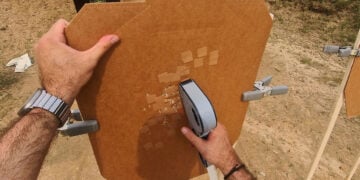Whether you’re a frequent shooter or just visit the range occasionally, it’s essential to protect yourself from lead poisoning. Unfortunately, many shooters remain unaware of the risks that come with exposure to lead from firearms. This article will explain how lead exposure occurs when you shoot, clean your firearms, and handle spent ammunition, and provide the most up-to-date strategies for protecting yourself and your family.
Understanding Lead Exposure When Shooting
Lead is commonly found in both bullets and primers. Each time you fire your gun, lead particles are dispersed into the air through the explosion of the primer and bullet friction. These particles settle on your skin, clothing, and gear, creating a potential health hazard. In addition, lead is present in the residue that accumulates on your firearm, which is released when cleaning it. Even spent brass casings can carry lead particles, meaning you can be exposed simply by collecting your brass after a session.
Lead exposure is especially hazardous because it builds up in the body over time, particularly in bones and soft tissues. Over the years, this accumulation can lead to serious health problems like kidney damage, high blood pressure, neurological issues, and reproductive problems. There is no known safe level of lead exposure, especially for children, who absorb lead at a much higher rate than adults
Simple Steps to Reduce Lead Exposure
Use Lead-Free Ammunition and Primers
Today, several manufacturers offer non-toxic, lead-free ammunition, which is a great option for reducing exposure, particularly for indoor shooting where ventilation might be poor. Federal, Winchester, and CCI all produce lead-free options, including frangible bullets that are designed to disintegrate upon impact, reducing airborne lead particles. While these rounds are typically more expensive, the long-term benefits to your health are worth considering.
Prioritize Proper Ventilation
Indoor shooting ranges can be a hotspot for lead exposure due to poor ventilation. Choose outdoor ranges when possible, or ensure the indoor range you use complies with OSHA’s air quality standards. Good airflow helps minimize the concentration of lead in the air, reducing what you inhale.
Adopt Rigorous Hygiene Practices
After shooting, avoid touching your face, eating, or smoking until you’ve thoroughly washed your hands and face with cold water and soap. Hot water opens your skin’s pores, increasing the likelihood of lead absorption. Additionally, always shower as soon as possible after your range session and change your clothes, ideally before entering your home. Washing your shooting clothes separately from other laundry prevents cross-contamination.
Use Dedicated Gear and Storage
Designate a specific pair of shoes for the range and avoid bringing them into your home. Store them in the garage or a separate area to avoid tracking lead into living spaces. Similarly, if you collect brass, use a dedicated container and avoid putting them in your pockets or hats, as these can become contaminated with lead dust.
Clean Firearms Safely
When cleaning your firearms, do so in a well-ventilated space and wear disposable gloves to prevent direct contact with lead residues. It’s a good idea to place cleaning mats or disposable rags under your gun to catch lead particles that may be released during cleaning. Avoid cleaning in common living areas or around children, and always wash your hands thoroughly afterward.
Protecting Your Family
Lead poisoning doesn’t just affect you—it can impact your family, particularly children. Lead dust can easily be transferred from your clothing, skin, or shoes to surfaces at home, where it can be ingested by others. Avoid contact with your family, especially children, until you’ve cleaned up after a range session
Conclusion
Lead exposure is a serious health risk for shooters, but by taking proper precautions, you can significantly reduce the danger. From using lead-free ammunition to prioritizing ventilation and hygiene, these simple steps can protect you and your loved ones from the harmful effects of lead poisoning. Stay safe, stay informed, and make lead safety a priority on your next range visit.










does wearing a n95 mask help with lead at firing range.